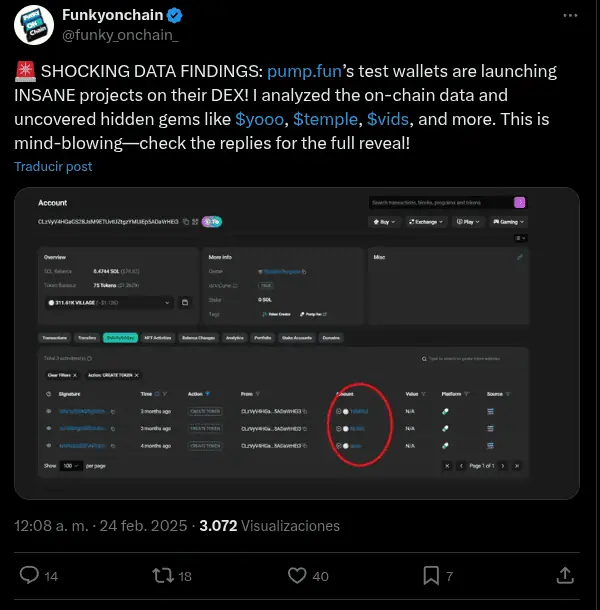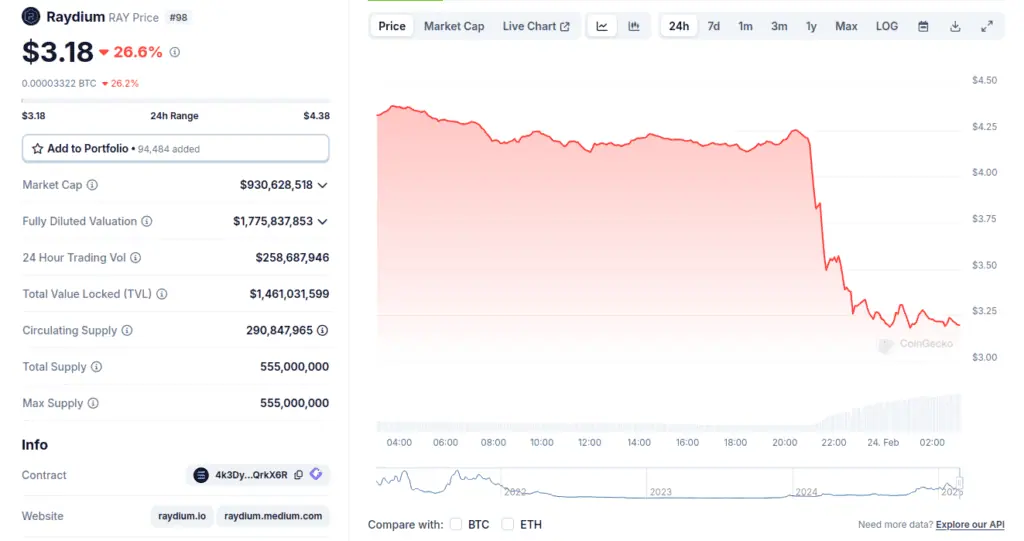
Pump.fun appears to be designing its own DEX in order to not depend on Raydium, and thus keep everything in its own ecosystem.
Pump.fun, Solana’s well-known meme generator platform, is revolutionizing the world of cryptocurrencies and decentralized exchanges (DEX) with a bold initiative. The platform is testing an in-house Automated Market Maker (AMM), a move that could change the landscape of meme tokens on Solana.
This new AMM could replace Raydium, the traditional DEX that currently facilitates transactions for many tokens launched on Pump.fun. This is how he made it known @funkyonchain, a well-known on-chain intelligence community on its X account:

With that, Pump.fun is not only looking to reduce its dependence on external services, but also to retain a larger portion of the fees that currently flow to Raydium. This change could not only transform traders’ experience with tokens created on the platform, but also elevate Pump.fun to a whole new level in terms of influence and utility within the Solana ecosystem.
Pump.fun and its rise in the Solana ecosystem
Before we dive into the internal AMM, it is essential to understand the role that Pump.fun has played in the Solana ecosystem. Since its launch in January 2024, the platform has become the epicenter of memecoins, allowing users to create tokens quickly and easily. Initially, the cost of launching a token was minimal, and even free, which attracted a large number of creators and traders.
However, Pump.fun's real success lies in its ability to combine memecoin culture with a unique experience. The platform has generated over $500 million in trading fees, according to data from DeFillama, and currently accounts for over 60% of transactions on Solana’s DEX. Tokens such as PNUT, CHILLGUY, and ACT have achieved spectacular returns, attracting thousands of traders looking to take advantage of the memecoin boom.
Despite its success, Pump.fun has faced significant challenges, including the exploitation of its system by hackers and the emergence of inappropriate content during its live streams. However, these obstacles have not stopped its growth, and now, with the introduction of its own AMM, the platform is on the verge of making a quantum leap.
Pump.fun's internal AMM: a leap towards self-sufficiency
The Automated Market Maker (AMM) is a key component in decentralized markets as it allows for the creation of liquidity pools where traders can buy and sell tokens without the need for a centralized order book. Instead of relying on Raydium to make graded tokens tradable, Pump.fun is developing its own AMM to retain full control over its ecosystem.
This change has several important implications:
- Reducing external fees: Currently, tokens launched on Pump.fun must migrate to Raydium to be traded more broadly. This process generates fees for Raydium, which have become a significant expense for Pump.fun. By implementing an internal AMM, the platform will be able to retain these fees, which will not only improve its profit margins but also result in increased liquidity for the tokens in its ecosystem.
- Improved user experience: An internal AMM will allow Pump.fun users to buy and sell tokens directly on the platform, without the need to interact with multiple interfaces. This will simplify the process for new users and reduce friction, which can encourage greater participation in the ecosystem.
- Improved Liquidity: By consolidating token creation and trading into a single platform, Pump.fun will be able to offer deeper and more stable liquidity pools. This will be especially beneficial for projects participating in King of the Hill, a popular game in which traders compete to dominate the market for a particular token.
- Greater control and customization: With an in-house AMM, Pump.fun will have the ability to adjust market parameters more agilely, allowing it to quickly adapt to the needs of its community and changes in the market.
The impact on Solana and Raydium
The launch of Pump.fun’s internal AMM will not only impact the platform itself, but will also have repercussions on the Solana ecosystem and Raydium. On the one hand, Solana is known for its speed and efficiency, making it ideal for decentralized applications. With Pump.fun’s AMM, Solana could further establish itself as a hub for token creation and trading. The increased concentration of liquidity on a single platform could attract more projects and traders to the ecosystem, which would benefit the network as a whole.
However, there are also concerns about Pump.fun’s over-reliance. With the platform already accounting for over 60% of transactions on Solana DEXs, some experts fear that the ecosystem could become too centralized and vulnerable to platform issues. If Pump.fun were to face a shutdown, this could have a significant impact on the entire network.
Raydium The end of an era?
raydium, for its part, could be the most affected by this change. As the primary DEX for tokens launched on Pump.fun, Raydium has enjoyed a large amount of volume and fees. However, if Pump.fun decides to fully migrate to its own AMM, Raydium could lose a significant portion of its traffic.
According to sources close to the platform, trading volume on Raydium could decrease by 30-50% if Pump.fun decides to go ahead with the transition. This would not only affect the platform’s fees, but could also weaken its position in the DEX market.
Raydium's token, RAY, has already begun to reflect this uncertainty. Over the past 24 hours, its value has decreased by more than 20%, according to data from CoinGecko. While this drop may be due to other market factors, it is clear that the Pump.fun news has raised concerns among investors.

A new chapter for Pump.fun and Solana
Although Pump.fun’s internal AMM is still in development, its potential is huge. On the one hand, the platform could establish itself as a complete hub for token creation and trading, eliminating the need to rely on external DEXs. On the other hand, this change could attract more projects and traders to the ecosystem, which would strengthen its position on Solana.
However, there are also challenges that Pump.fun must overcome. These include the need to ensure the stability of the AMM, prevent manipulation of liquidity pools, and ensure that traders have a smooth and secure experience. This is especially difficult considering that Pump.fun is focused on memecoins.
But beyond this, Pump.fun’s development of an in-house AMM marks an important milestone in the evolution of the Solana platform and ecosystem. Not only does this change have the potential to transform the way traders interact with tokens, but it could also redefine Pump.fun’s role in the cryptocurrency market.
Investing in cryptoassets is not fully regulated, may not be suitable for retail investors due to high volatility and there is a risk of losing all invested amounts.


